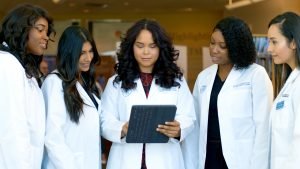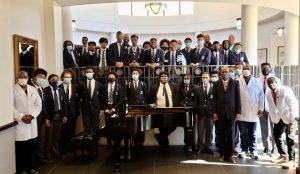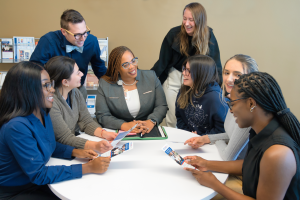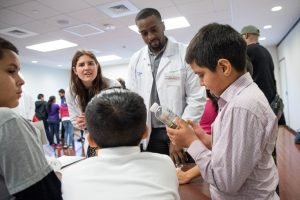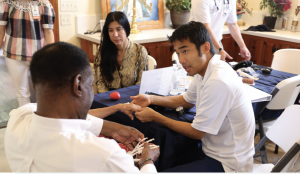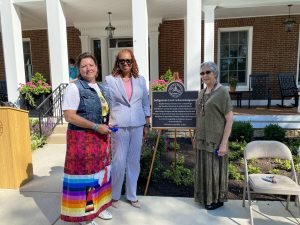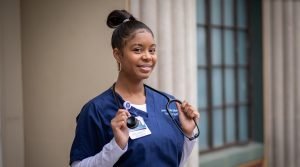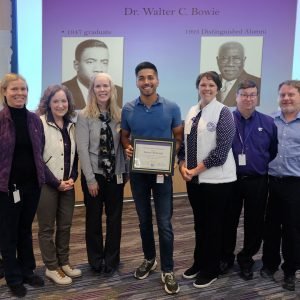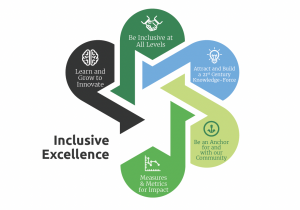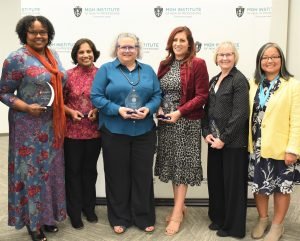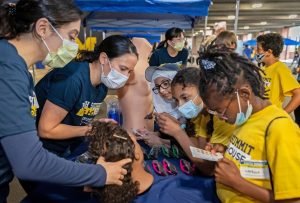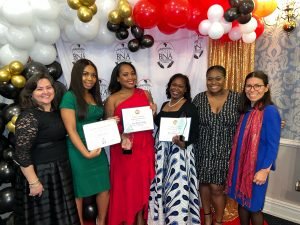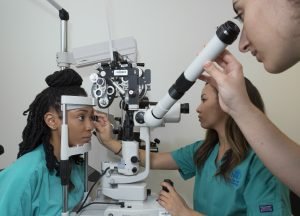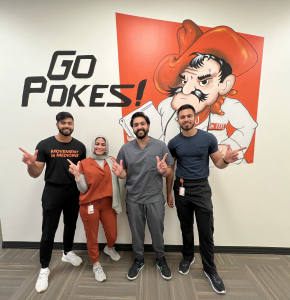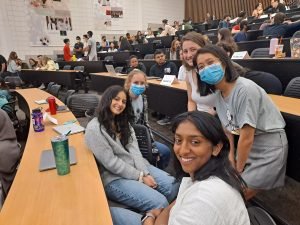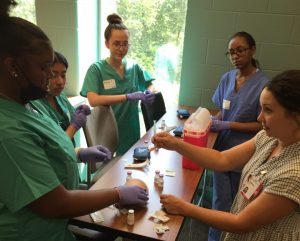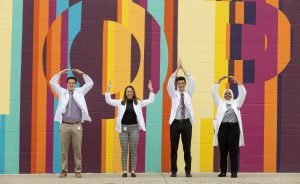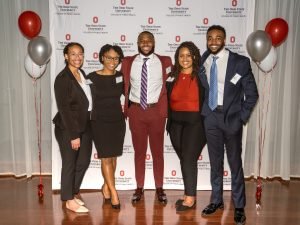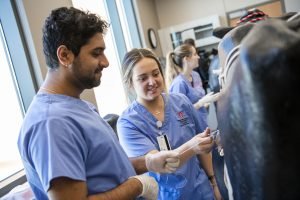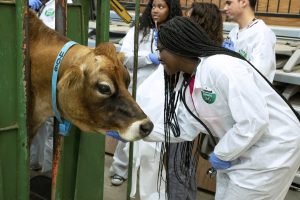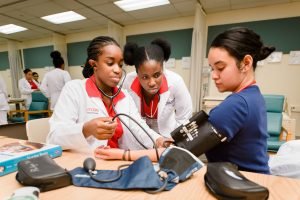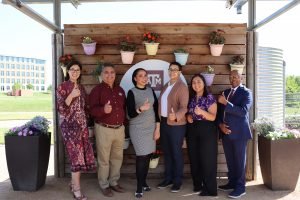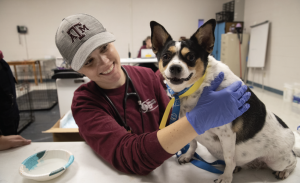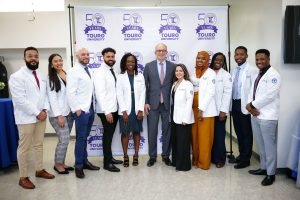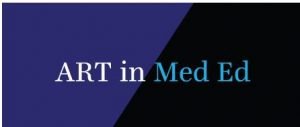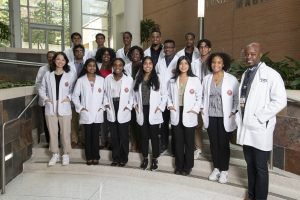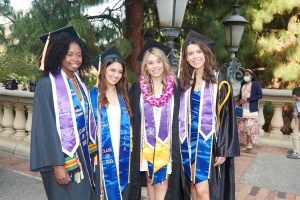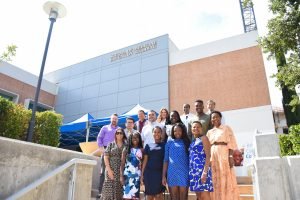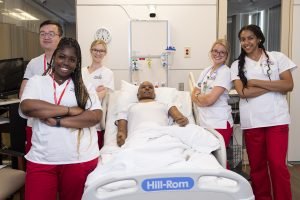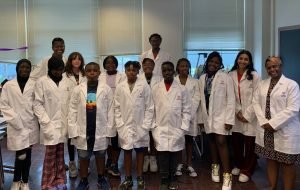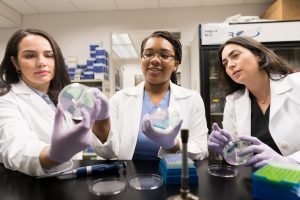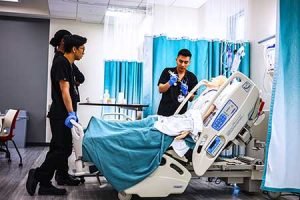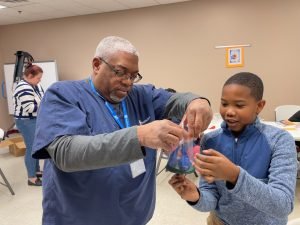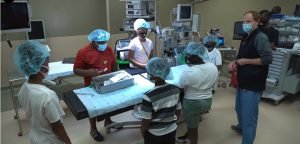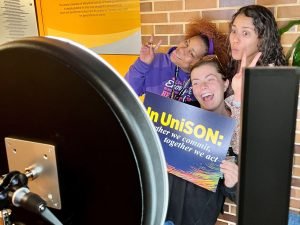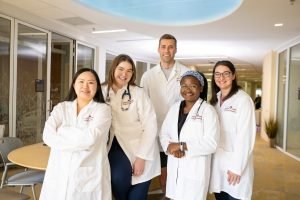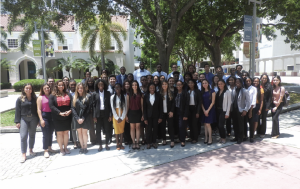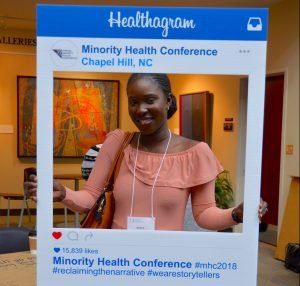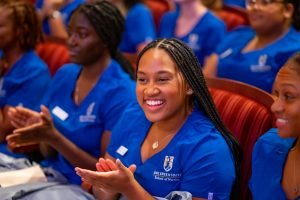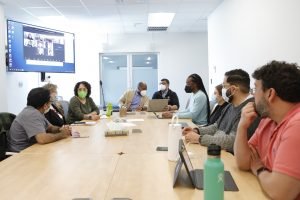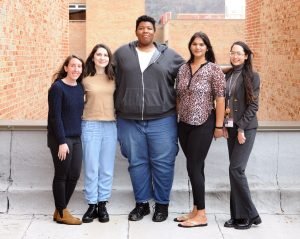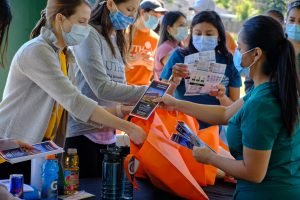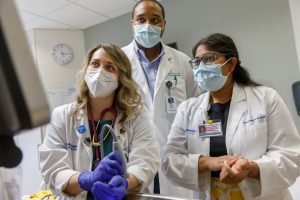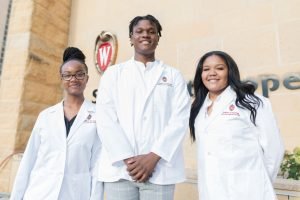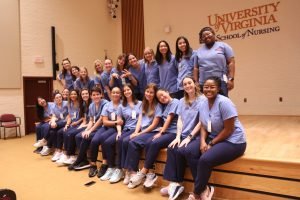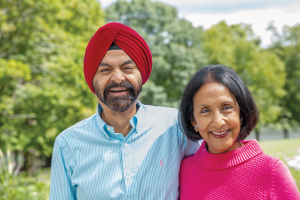 Creating Pathways to Academic Medicine — A.T. Still University of Graduate Health Studies
Creating Pathways to Academic Medicine — A.T. Still University of Graduate Health Studies
The Office for Diversity & Inclusion at A.T. Still University of Graduate Health Studies (ATSU) is a founding partner of the Academic Medicine Consortium of Arizona, a group of medical schools that collaborate to identify and nurture students toward academic medicine. ATSU is also creating a Grow Your Own faculty development program that offers a low-to-no-cost education designed to support students interested in academic medicine. The program is expected to launch in spring 2023. ATSU signed a memorandum of understanding with Saint Augustine’s University and North Carolina Central University to increase access for students of these historically Black colleges and universities.
 Pathway and Mentoring Programs — Burnett School of Medicine at Texas Christian University
Pathway and Mentoring Programs — Burnett School of Medicine at Texas Christian University
The Burnett School of Medicine at Texas Christian University’s Office of Diversity and Inclusion has created a program named Pathways to White Coats for Men of Color. The group met in February to view the documentary “Black Men in White Coats,” which was followed by a panel discussion featuring physicians of color, medical students, and local high school students. Another initiative, the Diversity and Inclusion Mentoring Network program, provides an opportunity for medical students and faculty members to develop a mentoring relationship in an informal environment.
 Elevating DEI Leadership — Burrell College of Osteopathic Medicine
Elevating DEI Leadership — Burrell College of Osteopathic Medicine
Burrell College of Osteopathic Medicine, which ranks second in the country in percentage of admitted students who are underrepresented in medicine, recently restructured its diversity and inclusion department and elevated the role of DEI operations and oversight into the institutional leadership position of chief diversity officer.
 Pathway Programs Begin in Elementary School — Donald and Barbara Zucker School of Medicine at Hofstra/Northwell
Pathway Programs Begin in Elementary School — Donald and Barbara Zucker School of Medicine at Hofstra/Northwell
The Donald and Barbara Zucker School of Medicine at Hofstra/Northwell pathway programs, which begin in third grade and continue through college, expose diverse students to the education and mentoring necessary to become medical professionals. For employees, including Zucker School of Medicine faculty, business employee resource groups foster a diverse and inclusive work environment.
 Focus on Areas Struggling with Physician Shortages — Edward Via College of Osteopathic Medicine
Focus on Areas Struggling with Physician Shortages — Edward Via College of Osteopathic Medicine
Edward Via College of Osteopathic Medicine (VCOM) is focused on recruiting students from rural, Appalachian, and Delta states — where there are physician shortages.— and over 90 percent of VCOM students are from one of these areas. In the past year, VCOM hosted more than 12 different DEI-focused events and two series on bias; one focused on privilege and the other was sponsored by the Diversity in Medicine club. Both were designed to provide a safe space for students to recognize intrinsic bias and understand how bias influences the world in which we live, specifically regarding health care. A portion of the latter series became part of orientation and the Professionalism and Ethics course.
 Acknowledging Tribal Land — Frontier Nursing University
Acknowledging Tribal Land — Frontier Nursing University
In September, Frontier Nursing University (FNU) held a land acknowledgment ceremony as part of its ribbon-cutting event that officially opened the university’s campus in Versailles, Ky. The action demonstrates that FNU acknowledges Versailles as traditional territory of the Shawnee and Cherokee people. Also, FNU recently launched five student interest groups, including International Students in Nursing, LGBTQIA+ Students in Nursing, Men in Nursing, Military/Veterans in Nursing, and Students of Color in Nursing.
 $50 Million Focused on Hiring Diverse Faculty — Johns Hopkins University School of Nursing
$50 Million Focused on Hiring Diverse Faculty — Johns Hopkins University School of Nursing
The Gaston-Johansson Faculty of Excellence Program was recently named in honor of Johns Hopkins University’s (JHU) first Black woman tenured, School of Nursing (JHSON) professor Fannie Gaston-Johansson. Part of a $50 million investment focusing on recruitment, retention, and advancement of faculty who demonstrate a commitment to DEI excellence, the program will bring an additional 30 diverse scholars to JHU with a focus on STEM fields. JHSON has the largest percentage growth of underrepresented faculty among JHU’s nine academic divisions. More than 45 percent of JHSON current students are from underrepresented populations.
 Recognizing Individual DEI Efforts — Kansas State University College of Veterinary Medicine
Recognizing Individual DEI Efforts — Kansas State University College of Veterinary Medicine
An award created by Kansas State University College of Veterinary Medicine (K-State CVM) recognizes those who stand up for justice, provide opportunities for equity, support and celebrate diversity, and promote inclusion. Fifty K-State CVM community members have already been recognized for their outstanding work in these areas. Each month, the college holds an Intercultural and Inclusion Lunch and Learn with guest speakers. Topics have included how to communicate about difficult subjects, resiliency, and the culture of India.
 Advancing DEI Principals — Medical College of Wisconsin
Advancing DEI Principals — Medical College of Wisconsin
The Medical College of Wisconsin’s (MCW) 61 academic units focused on the strategic goal of Health Starts Within through more than 420 inclusion and well-being initiatives across the institution. These intentional actions include programs, leadership development, initiatives, and system changes. The MCW Kern Institute held the Summit on Advancing Equity in the Learning Environment. Participants aligned work to prioritize equity-focused initiatives in the learning environment. Five areas were examined: curriculum, equitable assessment, mitigating bias, learning environment culture, and equity in research education.
 Creating a Community of Practice — MGH Institute of Health Professions
Creating a Community of Practice — MGH Institute of Health Professions
The Office of Justice, Equity, Diversity, and Inclusion (JEDI) at the MGH Institute of Health Professions launched the JEDI Curriculum and Pedagogy Community of Practice, a voluntary group created to share experiences, identify needs, provide mutual support, foster community, and advance strategic initiatives such as faculty development days.
 Engaging Middle Schoolers in Health Professions — Michigan Medicine University of Michigan Medical School
Engaging Middle Schoolers in Health Professions — Michigan Medicine University of Michigan Medical School
More than 11,000 people have participated in Building Toward Belonging: Implicit Bias Training, a program that fulfills a state mandate from the Michigan Department of Licensing and Regulatory Affairs for health care providers and supports the Michigan Medicine University of Michigan Medical School (UMMS) priorities of belonging, diversity, equity, and inclusion. Diversity of Health Care: Inaugural Youth Summit at the Big House, a daylong outreach event, welcomed more than 200 local middle school students to the Michigan stadium and engaged diverse students with 35 UMMS departments. Students interacted with practitioners and explored career opportunities in health care.
 Performance Reviews Include DEIB Goals — New York University Rory Meyers College of Nursing
Performance Reviews Include DEIB Goals — New York University Rory Meyers College of Nursing
New York University Rory Meyers College of Nursing (NYU Meyers) faculty, staff, and administrators now identify a diversity, equity, inclusion, and belonging goal in the annual performance review process. A majority of NYU Meyers nursing faculty hires this academic year are from underrepresented communities.
 Inclusive Campus Campaign — Nova Southeastern University College of Optometry
Inclusive Campus Campaign — Nova Southeastern University College of Optometry
Nova Southeastern University College of Optometry (NSUCO) launched DiversifEYE, a campaign to promote campus inclusivity. The campaign resulted in the creation of a diversity committee and director appointment, opportunities for candid conversations, identification of areas for improvement, and training for all constituents as well as multiple scholarship opportunities for underrepresented students, including the establishment of an endowed fund that will allow for these scholarships in perpetuity. NSUCO’s Preparatory Optometry Program provides a platform to assist underrepresented students in the pursuit of optometric education and to advance their success in the program.
 Crowdfunding Support for DEI Programming — Oklahoma State University Center for Health Sciences
Crowdfunding Support for DEI Programming — Oklahoma State University Center for Health Sciences
The Office of Diversity, Equity, and Inclusion at Oklahoma State University Center for Health Sciences (OSU-CHS) launched a fundraising campaign in 2021 through OSU Foundation’s PhilanthroPete crowdfunding platform, which allows faculty, staff, and students the opportunity to donate to a fund supporting student and resident events, diverse student organizations, medical resident needs, and DEI programming. Also in the past year, students took the initiative to form the Latino Medical Student Association and the American Muslim Medical Student Association, showcasing the growing diversity at OSU-CHS.
 Building Student Communities — The Ohio State University College of Medicine
Building Student Communities — The Ohio State University College of Medicine
The Ohio State University (OSU) College of Medicine has two newly created student organizations. One is for students in medicine who identify as Middle Eastern and North African, and the other, called the Disability Advocacy Coalition, focuses on advocacy around accessibility. The OSU College of Medicine ensures implicit bias mitigation training happens during the first semester of a student’s first academic year.
 Summer Institute Demonstrates Success — The Ohio State University College of Nursing
Summer Institute Demonstrates Success — The Ohio State University College of Nursing
The Ohio State University College of Nursing hosts an annual Summer Institute for Future Nurses to introduce diverse groups of high school students to the nursing profession. The program was hybrid for 2022 and resumed on-campus clinical skills labs. Twenty-three former participants have graduated from college with a bachelor of science in nursing. The college has launched an interprofessional Health Equity Scholars program, designed to prepare students with advanced education and skills to guide the generation or implementation of evidence to improve health equity in the community.
 Supporting Student Pathways — The Ohio State University College of Optometry
Supporting Student Pathways — The Ohio State University College of Optometry
The Ohio State University College of Optometry last summer instituted the Buckeye Launch Program, an intensive pre-orientation to ensure that students reach their full potential. The new summer bridge/first-year experience program also aims to increase students’ sense of belonging. The Improving Diversity in Optometric Careers (I-DOC) summer pathway program invites underrepresented undergraduate students to a multiday summer experience at the College of Optometry.
 Inclusive Excellence Team Certification — The Ohio State University College of Public Health
Inclusive Excellence Team Certification — The Ohio State University College of Public Health
The Ohio State University College of Public Health (CPH) dean’s administrative leadership team and staff are in the inaugural class of the university’s new Inclusive Excellence Team Certificate Program. The intensive nine-month opportunity includes a capstone project to advance the college’s goals around diversity, equity, and inclusive excellence. In addition, Dean Amy Fairchild added an associate dean for faculty and inclusive excellence to her leadership team who is charged with articulating and advancing a vision for inclusive excellence and providing leadership to enhance excellence in teaching, scholarship, and service.
Weaving DEI into Professional Development — The Ohio State University College of Veterinary Medicine
The Ohio State University College of Veterinary Medicine is implementing the idea of shared values into its professional development curriculum to better align diversity and inclusion principles with the values of the university and the College of Veterinary Medicine. The college also created a leadership group for student organizations focused on historically excluded populations to provide support and growth opportunities.
 Program Provides Student-to-Student Mentoring — Purdue University College of Veterinary Medicine
Program Provides Student-to-Student Mentoring — Purdue University College of Veterinary Medicine
High school and college students participating in Purdue University College of Veterinary Medicine’s (PUCVM) yearlong Vet Up! Champions program are mentored by current veterinary medical students. Through the Vet Up! College Veterinary Clinical Experiences program, college participants are immersed in the curriculum, animal experiences, and culture during a monthlong summer stay at PUCVM. Students are then placed at clinical sites in their residential communities to gain hands-on veterinary experiences, many of which continue beyond the summer program.
 DEI Strategies in Action — Rutgers University School of Nursing
DEI Strategies in Action — Rutgers University School of Nursing
Rutgers University School of Nursing (RUSON) launched a new DEI strategic plan that features actionable, measurable goals toward creating an environment that is actively anti-racist and anti-biased. New initiatives include the volunteer group Voices of Color, offering space for faculty and staff of color to build a community of respect, dignity, and equality. DEI-focused development efforts at RUSON resulted in a $2 million endowment received in fall 2022, which will provide four-year scholarships for first-generation college students from underrepresented communities in Newark, N.J.
 Deans CARE Interns — Texas A&M University Irma Lerma Rangel School of Pharmacy
Deans CARE Interns — Texas A&M University Irma Lerma Rangel School of Pharmacy
Deans Committed to Anti-Racism Efforts (Deans CARE) launched to actively support Texas A&M University’s steady progress toward creating a vibrant climate for DEI. Three students had the opportunity to serve as Rangel School of Pharmacy Deans CARE interns, working to compile and improve DEI resources. A $1 million award from the U.S. Food and Drug Administration Office of Minority Health and Health Equity allows researchers from Rangel School of Pharmacy and the American Association of Colleges of Pharmacy to advance enrollment of people from underrepresented populations in clinical trials.
 Fostering Community Outreach — Texas A&M School of Veterinary Medicine & Biomedical Science
Fostering Community Outreach — Texas A&M School of Veterinary Medicine & Biomedical Science
Texas A&M School of Veterinary Medicine & Biomedical Sciences (VMBS) DVM students offer free wellness checkups and vaccinations in support of pets from families with reduced access to veterinary care. One project has provided preventative care to more than 1,240 animals in the Rio Grande Valley over two years. The VMBS Committee for Inclusion, Diversity, Equity & Accountability works to enhance diversity and promote a positive and inclusive culture within the school by hosting activities and training opportunities that foster a welcoming and respectful environment.
 Focus on Underrepresented Students — Touro College of Osteopathic Medicine
Focus on Underrepresented Students — Touro College of Osteopathic Medicine
At the close of the 2020-2021 academic year, 15 percent of students in the Touro College of Osteopathic Medicine’s (TouroCOM) graduating class were from underrepresented groups, compared with the national average of 9.3 percent, and about half of TouroCOM’s graduates work in underserved communities or primary care shortage areas. Success is achieved through a combination of efforts including fundraising for scholarships, supporting community service opportunities, and student-led recruitment efforts. TouroCOM also runs a successful two-year STEM afterschool program, MedAchieve, and a popular master of science degree to doctor of osteopathic medicine pathway program that helps prepare students for the rigors of medical school.
 Anti-Racist Transformation — The University of Arizona College of Medicine – Phoenix
Anti-Racist Transformation — The University of Arizona College of Medicine – Phoenix
The University of Arizona (UArizona) College of Medicine – Phoenix is one of 11 schools selected to participate in the Anti-Racist Transformation in Medical Education initiative, a three-year program funded by the Josiah Macy Jr. Foundation and designed to dismantle institutional racism, establish and maintain capacity for transformational change, and build a community of practice within and across schools. The college also secured nearly $500,000 in scholarship funding for students underrepresented in medicine, created an anti-racist curriculum, and offered faculty development on teaching anti-racist medicine. UArizona College of Medicine – Phoenix welcomed its most diverse class of students this year.
 Academy for Underrepresented K-12 Students — University of Arkansas for Medical Sciences
Academy for Underrepresented K-12 Students — University of Arkansas for Medical Sciences
The University of Arkansas for Medical Sciences successfully launched Pathways Academy, which provides statewide and year-round programs for underserved and underrepresented K-12 scholars as well as resources, training, and professional development for advocates and teachers. More than 500 scholars participated in the initial launch, with enrollment expected to double within the next year. With the expansion and rebranding of outreach programs for undergraduate students from underserved and underrepresented groups, these statewide programs are now collectively a part of Health Career University.
 Record Number of Transfer Students — University of California, Los Angeles School of Nursing
Record Number of Transfer Students — University of California, Los Angeles School of Nursing
The University of California, Los Angeles School of Nursing (UCLA Nursing) doubled the size of its transfer student class for the 2022-2023 academic year, marking the school’s largest transfer class in its history. UCLA Nursing is also developing the Southern California Regional Emerging and Hispanic Serving Institution Partnership pathway program to promote enrollment of underrepresented students in advanced nursing degree programs, including master’s and doctoral degrees.
 Inaugural DEI Colloquium — University of California, Riverside School of Medicine
Inaugural DEI Colloquium — University of California, Riverside School of Medicine
The University of California, Riverside School of Medicine (UCR SOM) DEI Committee hosted its inaugural Diversity, Equity, and Inclusion Colloquium, featuring a keynote address and fireside chat with U.S. Representative Raul Ruiz, MD (D), who is also a UCR faculty member. In addition, UCR SOM participated in the Association of American Medical College’s Collective Action Initiative on Advancing Diversity, Equity, and Inclusion. As part of this initiative, the school completed the Diversity, Inclusion, Equity, and Culture (DICE) Inventory.
 Implementing a New DEI Strategic Plan — University of Cincinnati College of Nursing
Implementing a New DEI Strategic Plan — University of Cincinnati College of Nursing
The University of Cincinnati College of Nursing (UC College of Nursing) participated in the design and implementation of a DEI strategic plan led by Ann Gakumo, PhD, the college’s inaugural Greer Glazer Endowed Chair for Diversity, Equity, and Inclusion. UC College of Nursing also established a new program to increase educational opportunities for individuals from disadvantaged backgrounds, Cultivating Undergraduate Nursing Resilience and Equity. The program is funded by a Nursing Workforce Diversity grant provided by the federal Health Resources and Services Administration.
 Community Youth Outreach — University of Cincinnati James L. Winkle College of Pharmacy
Community Youth Outreach — University of Cincinnati James L. Winkle College of Pharmacy
University of Cincinnati James L. Winkle College of Pharmacy (JLWCOP), as part of the University of Cincinnati Academic Health Center and in collaboration with the Breakthrough Cincinnati organization, offers a summer learning experience for young people in grades six through nine in which they explore health care professions, health promotion, disease prevention, and healthy choices. JLWCOP also supports the Cincinnati Public School Pharmacy Tech Program, which allows students to work toward becoming certified technicians starting at age 17.
 Focus on Underrepresented Dentistry Students — University of Florida College of Dentistry
Focus on Underrepresented Dentistry Students — University of Florida College of Dentistry
Racially and ethnically underrepresented graduates at the University of Florida College of Dentistry (UFCD) had a 100 percent on-time graduation rate within the class of 2022. The school secured $1 million in recruitment scholarship funds over the past two academic years for UFCD students who have a demonstrated commitment to breaking down barriers and for welcoming individuals who are underrepresented in dentistry at UFCD.
 Teaching Ethics and Implicit Bias — University of Houston College of Nursing
Teaching Ethics and Implicit Bias — University of Houston College of Nursing
Shermel Edwards-Maddox, University of Houston College of Nursing (UH Nursing) professor of practice, and Danielle Quintana, clinical assistant professor, explore ethics and implicit bias in nursing education. They emphasize that nurses are responsible for promoting equality and diversity by treating all patients and colleagues with respect and dignity. UH Nursing was one of 10 programs nationwide to receive a grant to build COVID-19 vaccine confidence. The American Association of Colleges of Nursing provided the funding after receiving $1 million from the Centers for Disease Control and Prevention to create such initiatives.
 Junior Faculty Pathway Program — University of Kentucky College of Medicine
Junior Faculty Pathway Program — University of Kentucky College of Medicine
A junior faculty pathway program, Dynamic Appointments in the Research Title Series, was created by University of Kentucky College of Medicine (UKCOM) to bridge the postdoctoral fellows and tenure-track faculty appointments. Also, the college committed $3 million to the COMMITS Hiring Initiative, which will support recruitment and hiring and enhance diversity in biomedical sciences at UKCOM. Another pathway initiative, Black Boys and Men in Medicine, is a mentorship program designed to address the crisis of underrepresentation of Black men in medicine. Each month, diverse sixth through eighth grade students participate in hands-on activities and presentations to expose them to medicine as a career path.
 Community Outreach Addresses HIV/AIDS — University of Louisville Health Sciences Center
Community Outreach Addresses HIV/AIDS — University of Louisville Health Sciences Center
Jelani Kerr, PhD, associate professor in the University of Louisville (UL) Health Sciences Center’s School of Public Health and Information Sciences, produced the documentary “Healing in the Valley,” which focuses on his research concerning HIV effects on African Americans. Kerr investigates individual and social factors that influence HIV/AIDS disparities and partners with communities to develop interventions. UL School of Medicine’s Student National Medical Association chapter teamed up with community partners to create Future Healers, which introduces youth to the field of medicine and helps them navigate the emotional trauma of increased violence in their communities.
 Increasing Student Diversity — University of Maryland School of Nursing
Increasing Student Diversity — University of Maryland School of Nursing
The University of Maryland School of Nursing (UMSON) increased its percentage of underrepresented student groups to 52 percent in 2021, up from 44 percent in 2016. Diverse faculty and staff members increased to 44 percent in 2021, up from 30 percent in 2016. UMSON also launched an anti-oppression position statement in fall 2021 — In UniSON: Together We Commit, Together We Act.
 Increasing Diverse Student Enrollment — University of Minnesota School of Nursing
Increasing Diverse Student Enrollment — University of Minnesota School of Nursing
The University of Minnesota School of Nursing’s efforts to recruit and retain diverse students in the doctor of nursing practice (DNP) program resulted in an enrollment increase of 24 percent, up from 6 percent in 2015 to nearly 30 percent in 2021. Last year, the number of underrepresented graduates from the DNP program increased to 23 percent. In the past two years, the number of Black, Indigenous, and people of color joining the faculty rose from 13 percent to more than 25 percent. Campus DEI leaders and the Faculty Search Committee collaborated on implicit bias workshops and faculty listening sessions.
 New Pathway to Medical School — University of Miami Leonard M. Miller School of Medicine
New Pathway to Medical School — University of Miami Leonard M. Miller School of Medicine
The University of Miami Leonard M. Miller School of Medicine collaborated with Miami Dade College on a pathway program for underrepresented students interested in attending medical school. The School of Medicine also developed the self-guided Diversity, Equity, and Inclusion Certificate for Learners Program.
 Fostering Inclusivity and Health Equity — UNC Gillings School of Global Public Health
Fostering Inclusivity and Health Equity — UNC Gillings School of Global Public Health
The UNC Gillings School of Global Public Health (Gillings School) hosted the student-led Minority Health Conference on Revolutionary Healing and Rebuilding, which created space to acknowledge wounds of systemic racism, reflect on structural challenges and barriers to health equity, and advance work toward more equitable systems for the future. The Gillings School also held the third annual Inclusive Excellence Symposium to provide instructors — including faculty, instructional staff, and teaching assistants — with history, theory, and practical skills to critically analyze their course content, delivery methods, and assessment materials to foster inclusive classrooms, promote inclusive discussion, and facilitate critical conversations.
 Providing Access to Veterans and Active Military Students — UNC Greensboro School of Nursing
Providing Access to Veterans and Active Military Students — UNC Greensboro School of Nursing
UNC Greensboro School of Nursing supports the Veterans Access Program, which provides the opportunity for military veterans, active reservists, and active-duty military to earn a bachelor of science in nursing.
 Piloting Community Wellness Services — University of Rochester School of Nursing
Piloting Community Wellness Services — University of Rochester School of Nursing
The University of Rochester School of Nursing (URSON) Center for Employee Wellness developed a pilot program with the Anthony L. Jordan Health Center, a Federally Qualified Health Center, to provide condition management services (in person and via telehealth) by a registered nurse. The focus is on goal development and sustainable behavior change. In 2017, URSON began a new faculty recruitment initiative, in which postdoctoral fellows receive direct tenure-track faculty appointments after successfully completing their research. During the past five years, URSON has hired seven faculty members through the program, and four are now assistant professors.
 Multicultural Schools Grant — University of Tennessee College of Veterinary Medicine
Multicultural Schools Grant — University of Tennessee College of Veterinary Medicine
The University of Tennessee College of Veterinary Medicine (UTCVM) received a USDA NIFA Multicultural Scholars Grant enabling the college to enhance investment in efforts to increase underrepresented populations pursuing doctor of veterinary medicine degrees. Working with the Tennessee 4-H Program, UTCVM has begun a yearlong pilot program, 4-H Virtual Vet Science Club. The club meets monthly to introduce and enhance student engagement in veterinary medicine topics and careers, particularly opportunities in rural communities.
 Honoring Women in Dentistry — University of Texas Health Science Center at Houston School of Dentistry
Honoring Women in Dentistry — University of Texas Health Science Center at Houston School of Dentistry
Each September, the University of Texas Health Science Center at Houston School of Dentistry (UTSD) recognizes Women in Medicine Month by highlighting individuals at the dental school through its Women in Dentistry initiative. The recognition includes display banners that highlight women in various faculty, staff, and leadership positions as well as a Q&A series. Seeking recommendations leading to the enhancement of a diverse, equitable, and inclusive environment, UTSD performed a holistic DEI evaluation with faculty, staff, and students.
 Biomedical School for Youth — UT Southwestern Medical Center
Biomedical School for Youth — UT Southwestern Medical Center
UT Southwestern Medical Center is committed to strengthening the number of diverse health care providers and researchers through innovative programming, beginning with the new Biomedical Preparatory public school (currently serving pre-K to first-grade students, with plans to expand up to eighth grade) and continuing through graduate, health professions, public health, and medical schools.
 Impactful Programming for Underrepresented Students — University of Wisconsin-Madison School of Nursing
Impactful Programming for Underrepresented Students — University of Wisconsin-Madison School of Nursing
The University of Wisconsin-Madison School of Nursing recently created two new positions in the Office of Academic Affairs focused on student success. The positions will work to provide more high-touch, impactful programming for both pre-nursing and nursing students of color as well as transfer, first-generation, and other underrepresented student groups. Also, the school’s board of visitors and its alumni relations officer collaborated to implement a strategic plan for alumni engagement that began in 2020. In spring 2022, an alumni of color subcommittee formed. The group works to ensure that all alumni are heard and represented in the school’s programs and communications.
 Pinning Pledge Deepens Equity Commitment — University of Virginia School of Nursing
Pinning Pledge Deepens Equity Commitment — University of Virginia School of Nursing
The 2021-2022 academic year at the University of Virginia School of Nursing marked the unveiling at pinning of a new nursing student pledge that deepened students’ explicit commitment to equity and inclusion as an exemplar for its response to George Floyd’s murder. The school also welcomed the arrival of a new accelerated bachelor of science in nursing cohort that is 41 percent underrepresented students and one-third first-generation college attendees.
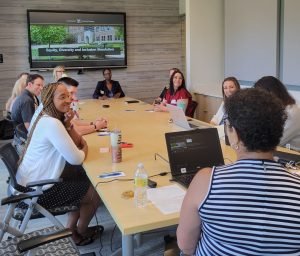
Implicit Bias Training — Vanderbilt University School of Nursing
During spring 2022, Vanderbilt University School of Nursing (VUSN) created seven different video-based simulations for implicit bias/inclusivity training for faculty and staff. More than 25 two-hour sessions were conducted over a four-month period. Nearly 100 percent of faculty and staff attended the training. Another major VUSN project was the expansion of a mobile COVID-19 vaccine unit. In collaboration with Vanderbilt University Medical Center and various community partners, VUSN has focused on vaccinating at-risk populations who face barriers to accessing vaccines.
 Debt-Free, Need-Based Financial Aid — Weill Cornell Medicine
Debt-Free, Need-Based Financial Aid — Weill Cornell Medicine
Weill Cornell Medicine’s debt-free, need-based financial aid program started in the 2019-2020 academic year to enhance equity in medical education and diversify Weill Cornell Medical College’s applicant pool. With the generosity of donors, Weill Cornell Medicine offered debt-free, need-based financial aid for students in the MD program. The inaugural Dean’s Diversity and Healthcare Disparity Research Awards, now known as the Ritu Banga Healthcare Disparities Research Awards, provide four levels of one-year research funding to investigators whose work seeks to improve the health of underrepresented groups and achieve health equity locally and globally.●
This article was published in our December 2022 issue.



